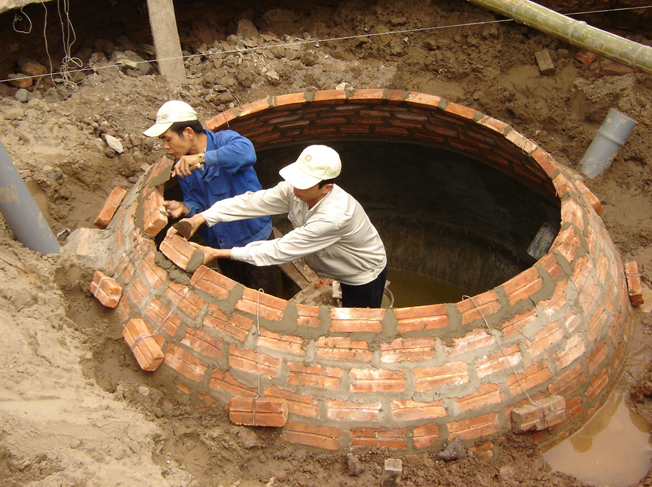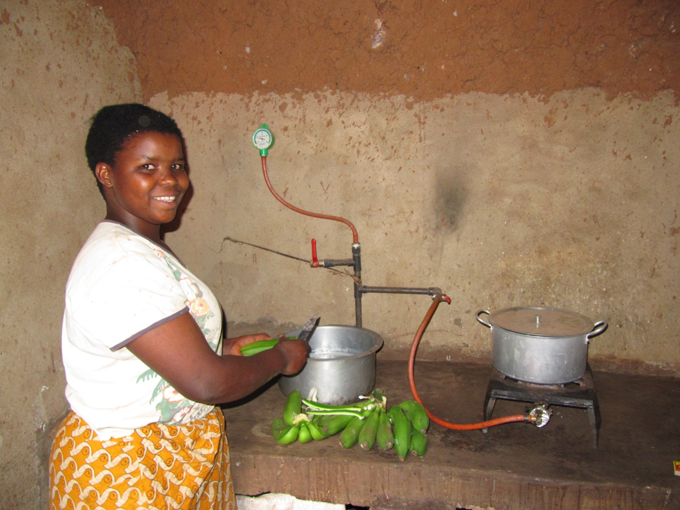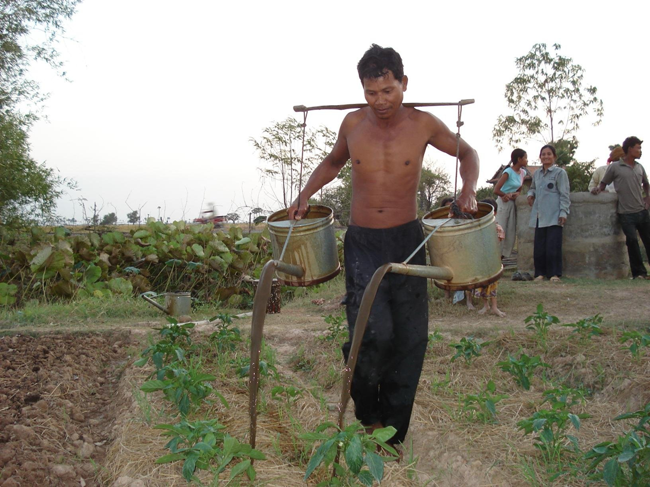DATABASE
SNV’s multi-actor biogas sector development approach
ongoing
Country
Zambia
Nepal
Pakistan
Kenya
Burkina Faso
Benin
Vietnam
Nicaragua
Uganda
Tanzania
Cameroon
Rwanda
Bhutan
Senegal
Ethiopia
Bangladesh
Indonesia
Cambodia
Laos
Budget
>5M $
Year
1989
Issue
Solutions
Link
www.snvworld.org
Abstract
Since 1989, SNV supported countries to provide access to household digesters through a market-based approach. By June 2014, about 620,000 digesters were installed in 19 countries providing 3.5 million people with sustainable fuel and organic fertiliser. The capacity of 2,000 local organisations was built instilling ownership and sustainability.
Project Description
SNV Netherlands Development Organisation is an international development organisation of Dutch origin with over 40 years of experience in Africa, Asia and Latin America. SNV supports national and local actors within government, civil society and the private sector in their endeavours to find and implement local solutions to development challenges. The case presented here is not so much about a particular project, but about an approach that has been developed 25 years ago in Nepal and since then refined and adapted to the local context in 18 other countries. In 1989, SNV started to support organisations in Nepal to set-up and implement the national biogas programme. The programme aimed to provide access to household bio-digesters fed by animal manure through a market-based approach driven by local private sector being companies constructing digesters and financial institutions providing credit to households. Equally important, capacity building was provided to relevant organisations to ensure sustainability of the support. In the national programmes, a wide range of functions are executed in a comprehensive and coordinated manner. Examples of such functions are promotion and marketing, financing, construction & after- sales service, operation & maintenance, quality control, training & extension, research & development, monitoring & evaluation, and programme management (see the attached reference). Whereas the function of operation & maintenance can only be executed by the users, other functions should be undertaken by multiple rather than single actors as much as possible to avoid monopolies, dependencies, and conflicts of interest. This allows competition on the supply side, from which the users, ultimately, will benefit. National and local governments, the private sector, and NGOs are guided to work together on the basis of proper role divisions, suitable institutional arrangements, and good governance. Governments should not engage in construction or credit facilities, but they could be involved in facilitation, promotion, regulation, financing and advocacy for donor funding. Proper institutional arrangements are key; multiple stakeholders, like construction companies and banks/MFIs, can only compete on a level playing field. From the start, such arrangements should be in place between user and supplier in the form of a sales contract, guarantee card, credit agreement, etc. Parallel programmes with different implementation modalities are to be avoided, as these will distort the market. Good governance (transparency and accountability) by all actors is paramount for all transactions to be concluded in the programme. As the household is financing the bio-digester through a credit or in cash, the national programmes strongly promote the concept of customer satisfaction. When biogas services fail to live-up to the expectations of the owner, it is the user who will suffer. In addition, there will be an immediate negative effect on the progress of the programme, as neighbouring potential users will delay or even cancel their investment decision. As a result, the market for biogas plants will perish. Hence, a strict enforcement of carefully designed quality standards is crucial in the promotion of biogas technology. These standards are not limited to the design, construction materials or method and after-sales service of biogas plants. They also include the quality of information provided to the potential users prior to their investment decision. If this decision is taken on the basis of wrong (erroneously high) expectations, these expectations will never be met after installation of the plant; product dissatisfaction by the user will prevail, even if the plant is kept in operation. Ensuring user-satisfaction requires actors on the supply side (constructors and lenders) to be fully accountable to the (prospective) customers and behave in a customer-friendly manner in order to increase their business. Based on the success in Nepal, SNV scaled out to other countries, first in Asia (an additional seven countries), then also in Africa (10 countries) and Latin America (one country) tailoring the programmes in these countries to their local context.
BENEFICIARIES
The beneficiaries are at household, local, national and global level, see the section on results. In particular, women and children in the households with livestock benefit from the biogas produced from the digesters. At local level, national programmes generate green employment and income for local companies and financial institutes.
Results
Bio-digesters provide multiple benefits at the household, local, national and global levels. These benefits are appreciated differently in different countries. Benefits for women: Women express great satisfaction with biogas, particularly with the instant cooking aspects it allows. Not only are time and labour for the collection of traditional cooking fuels and cleaning of cooking pots greatly reduced, but biogas is also much quicker and easier for cooking. Biogas is smokeless and does not require constant attention or blowing on the coals, as the use of wood fuel does. Women can put a pot on the burner and do other activities while the food is cooking. This workload reduction provides opportunities for women to embark on other activities, varying from earning additional income to extending childcare or self-development. Benefits for health: Noticeable improvements in the respiratory health and reductions in eye problems have been reported since the inception of the biogas programme. In some cases, older women who were no longer able to cook over an open fire were able to cook again with biogas. Better hygienic conditions are achieved through improved manure management and sanitation through toilets attached to the digester. The concept of latrine and biogas promotion in one package originated from the perception that both applications share the same target group (women and children), have similar benefits (comfort, hygiene, and time-saving), and have comparable promotion aspects. Financial and economic benefits: The primary impact of biogas plants on poverty alleviation is the reduction of the economic and the financial costs expended on fuel for cooking and lighting, as well as the improvement of food security through increased agricultural yields. Users of biogas plants often manage to stay away from the poverty trap. In the densely populated deltas of Vietnam, biogas plants offer farmers the opportunity to embark on small-scale piggery, which would not be allowed without a plant (socially and sometimes legally). Biogas addresses environmental limitations in such a way that it offers farmers a means to carve a living. However, biogas does not directly benefit those farmers without livestock who generally represent the very poorest strata of the society. They may benefit only indirectly, from greater availability of traditional fuels and employment opportunities. Still, biogas plant construction is a labour-intensive process that generates income and businesses in rural areas. Environmental benefits: In addition to the environmental improvement at the household level, biogas utilisation helps reduce deforestation. By returning bio-slurry to the fields, depletion of nutrients and organic matter in the soil is reduced, as is pressure to expand and clear land for agricultural purposes. Biogas is produced on a sustainable basis, as the carbon dioxide associated with its combustion is reabsorbed in the process of the growth of the fodder and food for animals and men, respectively. Therefore, by displacing traditional and fossil fuels, changing traditional manure management systems, and reducing the need for chemical fertiliser, biogas reduces greenhouse gas (GHG) emissions. By June 2014, about 620,000 digesters have been installed under the national programmes supported by SNV in 19 countries providing 3.5 million people with sustainable fuel and organic fertiliser (bio-slurry). The life of the digesters is minimum 15 years; about 90% of the units are in operation through a strict quality control system. In addition, the capacity of 2,000 different local organisations have been strengthened instilling national ownership and sustainability. The benefits recorded by data bases and surveys are manifold. At household level: Saving of firewood for cooking (1.1 million tonnes per year) and kerosene for lighting (11 million litres per year); no indoor air pollution as combustion of biogas is smokeless; saving of time (1.1 million hours per year); sanitation through improved manure management and attachment of toilets (by 40% of all households); application of bio-slurry for agricultural production (up to 20% higher yields) resulting in improved nutrition. Women express great satisfaction as workload reduction provides opportunities to embark on other activities like earning additional income. At local level: construction generating employment (300,000 labour-years created) and income. Firewood and charcoal savings resulting in deforestation and preserving natural resources. By applying bio-slurry, soil fertility is maintained. At global level: Digesters substantially mitigate greenhouse gas emissions (2.2 million tonnes per year).
Business Model
The ultimate objective of all activities undertaken in the framework of the national programmes is to arrive at a commercially viable biogas sector, a sector that can be sustained by capable stakeholders and financed without any Official Development Assistance (ODA). In essence, sector development should translate into biogas companies marketing their services to households on a commercial basis, whereby the latter have access to credit facilities to finance the investment. For this to happen, the primary process - the transaction between supplier and client - should follow the rigours of the market. In many countries, the biogas sector is developed weakly or is altogether absent at the start of the intervention. Sector development is a complex job and cannot be achieved overnight. A long-term effort may be required to create the required ‘critical mass.’ The challenge of this feature is that donors are often not able and/or willing to continue support for a long period, as their policy cycle is seldom longer than five years, often resulting in frequent shifts in priorities and objectives. For national governments in developing countries, priorities are usually manifold in nature, with household biogas as just one of the many sub-sectors that would be in need of support. As a result of such “short-sightedness,” many development efforts are begun but aborted early without getting a fair chance to grow. SNV is advocating the importance of a sustainable sector as a long-term objective and plays an active role in mobilising the required resources for subsequent phases of biogas programmes. Success and tangible impact are the crucial ingredients required to convince governments and donors to continue providing financial support to national programmes. Financing is the earlier phases of national programmes is often used to provide investment subsidies to households and to finance the programme activities. In addition, SNV increasingly embarks on the (often cumbersome) development of a carbon component to the biogas programmes to improve the financial feasibility of national programmes, thereby reducing the financial dependency on public funding.
Lessons Learnt
The national programmes are a beneficial endeavour for many countries helping commercialize and increase the use of an indigenous renewable and sustainable energy resource. Bio-digesters have positively affected the lives of farmers and especially women and children in the rural areas. The social and environmental conditions of hundred thousands of rural families have been improved. In addition, a number of economic benefits are being generated through the conservation of public goods through a commercial, market approach. A number of important lessons can be learnt regarding implementation of alternative energy technologies: • Understanding the end-user/market and designing a product that meets the needs and addresses the concerns; • Identifying the most appropriate and cost-effective design for the product before launching a wide-scale dissemination program; • Establishing and enforcing solid design, quality and service criteria that will ensure the reliable and cost-effective operation of installed digesters; • Identifying the key institutional players and assisting in strengthening the capacity of these players to effectively carry out their respective roles; • Securing the commitment and support of financial institutions to work in close partnership for the dissemination and financing of the product; • Identifying the financial incentives needed to stimulate the market and attract informed buyers; • Providing technical and management support to all key players; • Instituting coordinating committees to ensure the cooperation and partnership of stakeholders. In addition to the points that are listed above, one of the most important achievements of the national programmes is the sense of ownership among the key stakeholders.
Key Feature
In the programmes, impact targets are linked to capacity development targets. Targets on impact relate to the number of households getting access to bio-digesters, while capacity building targets relate to results in the areas of organisational strengthening and institutional development. Need for capacity building becomes clear when targets on impact are not reached in a qualified manner. All actors in the biogas programme are potential clients for capacity development services, whereby the focus may shift depending on performance at a certain time. Hence, impact-level is the main driver for capacity development. The challenge of this feature is that many development interventions merely look after one set of targets: impact or capacity development. Targeting impact without capacity development looks attractive, as it can generate tangible results short-term, but it often fails to sustain these results. Targeting capacity development without impact focus builds on the assumption that actors - after being capacitated - will automatically deliver to (prospective) customers. This assumption often does not materialise because the analysis of the required capacity development is determined by an actor and/or donor, but not tested in the market. SNV regards impact and capacity development as Siamese twins, strongly promoting the link between both. This concept was successfully applied during the set-up (formulation of objectives and activities, and estimate of required budgets) and implementation (monitoring, quality control, and reviews) of the national programmes. Impact targets, such as the number of households having installed a bio-digesters, are directly linked to the development of the capacity of parties on the supply side, such as the number of companies providing quality services on construction and after-sales service. Moreover, the content of capacity building is directly linked with observed gaps in service quality. Examples include quality control for biogas technicians, training support for participating vocational training institutes, business training for biogas companies, and administration training for participating government officials.
Other significant information
Though SNV has been playing a central supporting role in the set-up and implementation of all national biogas programmes, in particular in the early phases, the contribution of all international partners (donors) and different local organisations have to be acknowledged. In addition to the Netherlands Ministry of Foreign Affairs, we like to mention here the German Development Bank (KfW), People in Need, German Technical Cooperation (GIZ), Hivos (Dutch INGO) and DFID.
Main Donor
Netherlands Ministry of Foreign Affairs
(Government)
Implementing Actor
SNV Netherlands Development Organisation (International agencies)



